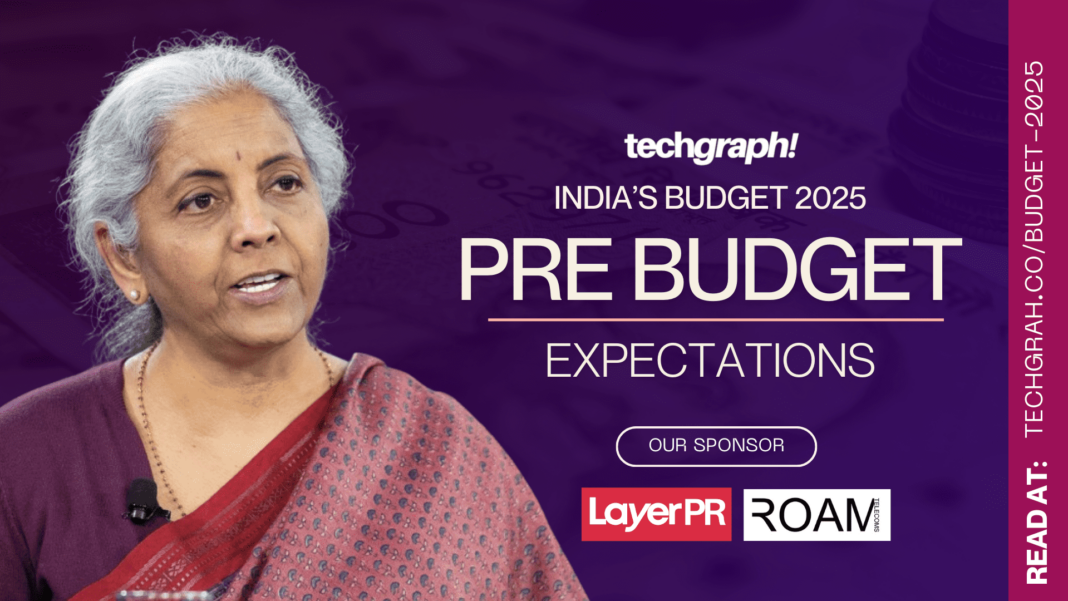As India prepares for the Union Budget 2025, business leaders are sharing their hopes for reforms aimed at fostering innovation and simplifying processes. There’s a strong push for rationalizing GST rates and easing compliance, which would improve the ease of doing business. Many are also looking for measures to support growth in key sectors like technology, MSMEs, and sustainable energy. The budget is also seen as an opportunity to further develop the nutraceutical sector, with a focus on PLI and RLI schemes that could help India compete globally in the coming years.
Read the budget expectations in detail:
Nikhil Kurhe, Co-founder & CEO, Finarkein Analytics
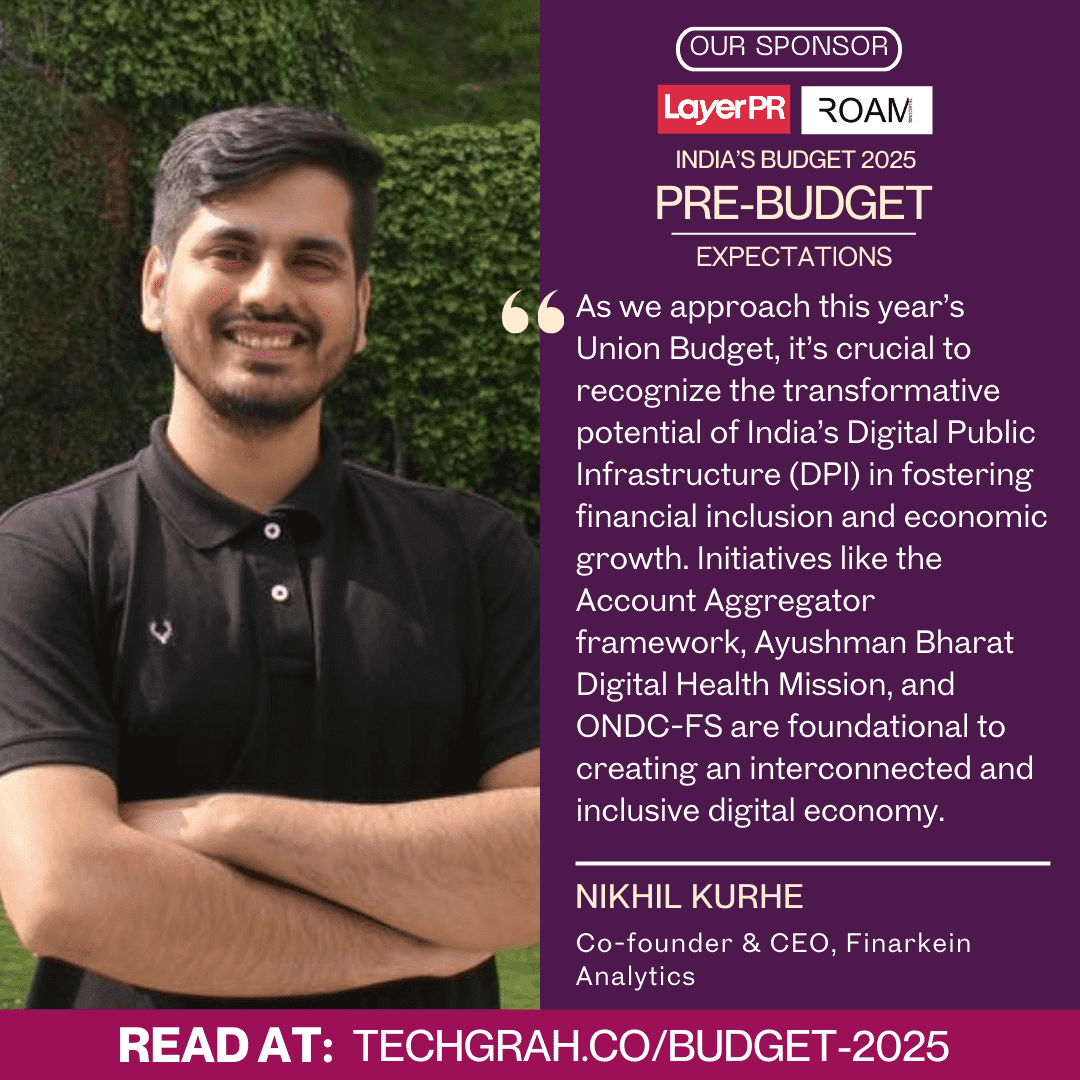
As we approach this year’s Union Budget, it’s crucial to recognize the transformative potential of India’s Digital Public Infrastructure (DPI) in fostering financial inclusion and economic growth. Initiatives like the Account Aggregator framework, Ayushman Bharat Digital Health Mission, and ONDC-FS are foundational to creating an interconnected and inclusive digital economy.
To drive widespread adoption and innovation around these digital public goods, the Budget can allocate targeted funding for capacity building, awareness campaigns, and incentives for early adopters. Establishing a dedicated innovation fund for DPI-focused startups can catalyze solutions tailored to underserved segments, including MSMEs and rural India. Additionally, simplifying regulatory frameworks and expanding support for secure data-sharing standards will encourage private sector collaboration while ensuring consumer trust.
The Budget is an opportunity to accelerate India’s leadership in digital innovation, not just for India but as a model for the world. A strategic focus on DPI can unlock unprecedented value across sectors, empowering citizens and businesses alike
Purusharth Malik, Tech, Smartphones & Digital Marketing Expert

I expect the Union Budget 2024-2025 to prioritize fostering innovation and supporting entrepreneurship through targeted reforms. Simplifying compliance processes for businesses and rationalizing GST rates would not only streamline operations but also enhance the ease of doing business.
Incentivizing sectors such as technology, MSMEs, and sustainable energy can create opportunities for growth and employment generation.
Introducing policies to support startups in emerging domains like AI, IoT, and green tech would further strengthen India’s global competitiveness. Infrastructure development, coupled with individual tax relief under the new tax regime, could spur domestic consumption and investment, driving holistic economic progress.
Amit Srivastava, Founder & Chief Catalyst, Nutrify Today
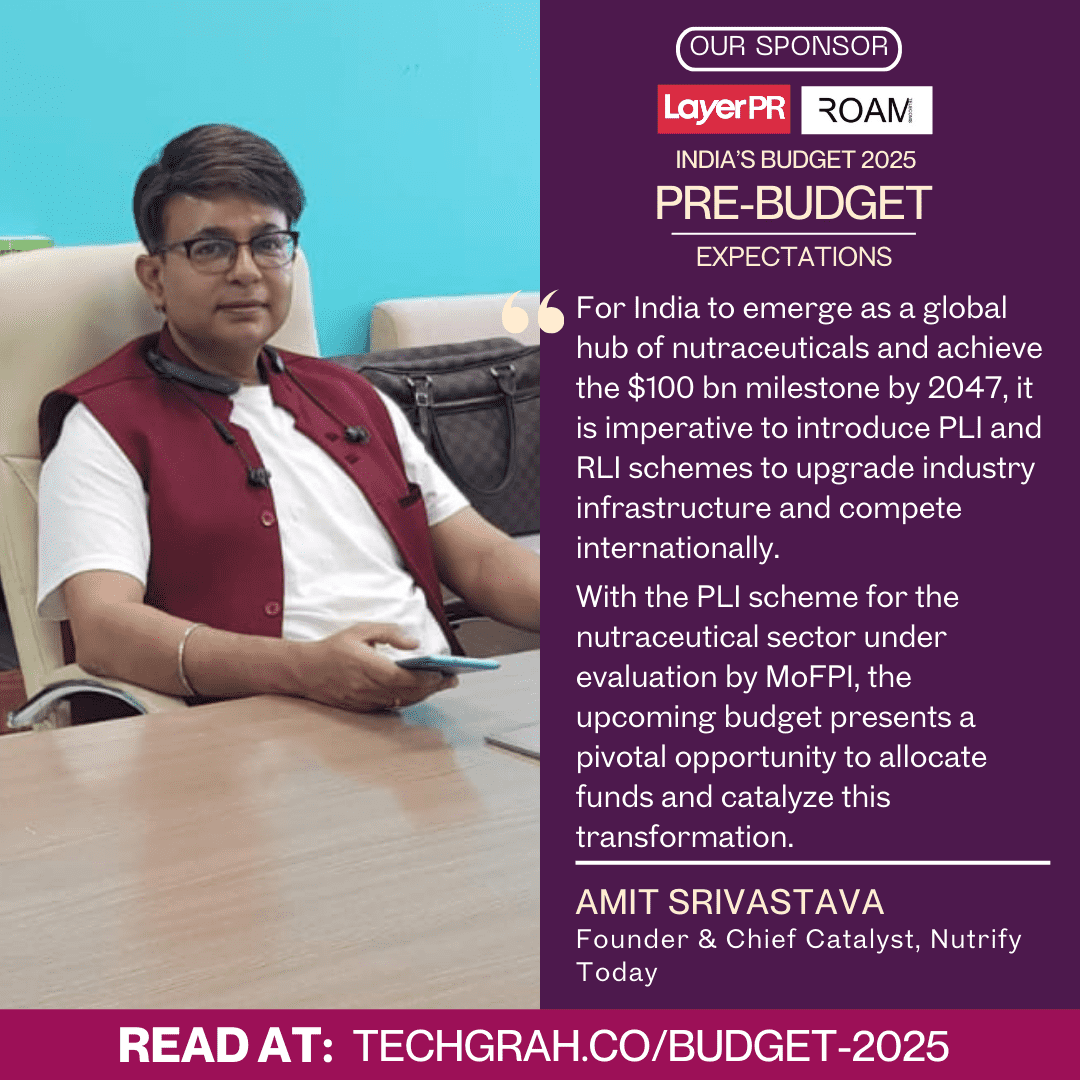
For India to emerge as a global hub of nutraceuticals and achieve the $100 billion milestone by 2047, it is imperative to introduce PLI and RLI schemes to upgrade industry infrastructure and compete internationally. With the PLI scheme for the nutraceutical sector under evaluation by MoFPI, the upcoming budget presents a pivotal opportunity to allocate funds and catalyze this transformation.
Sarvagya Mishra, Founder & Director of Superbot
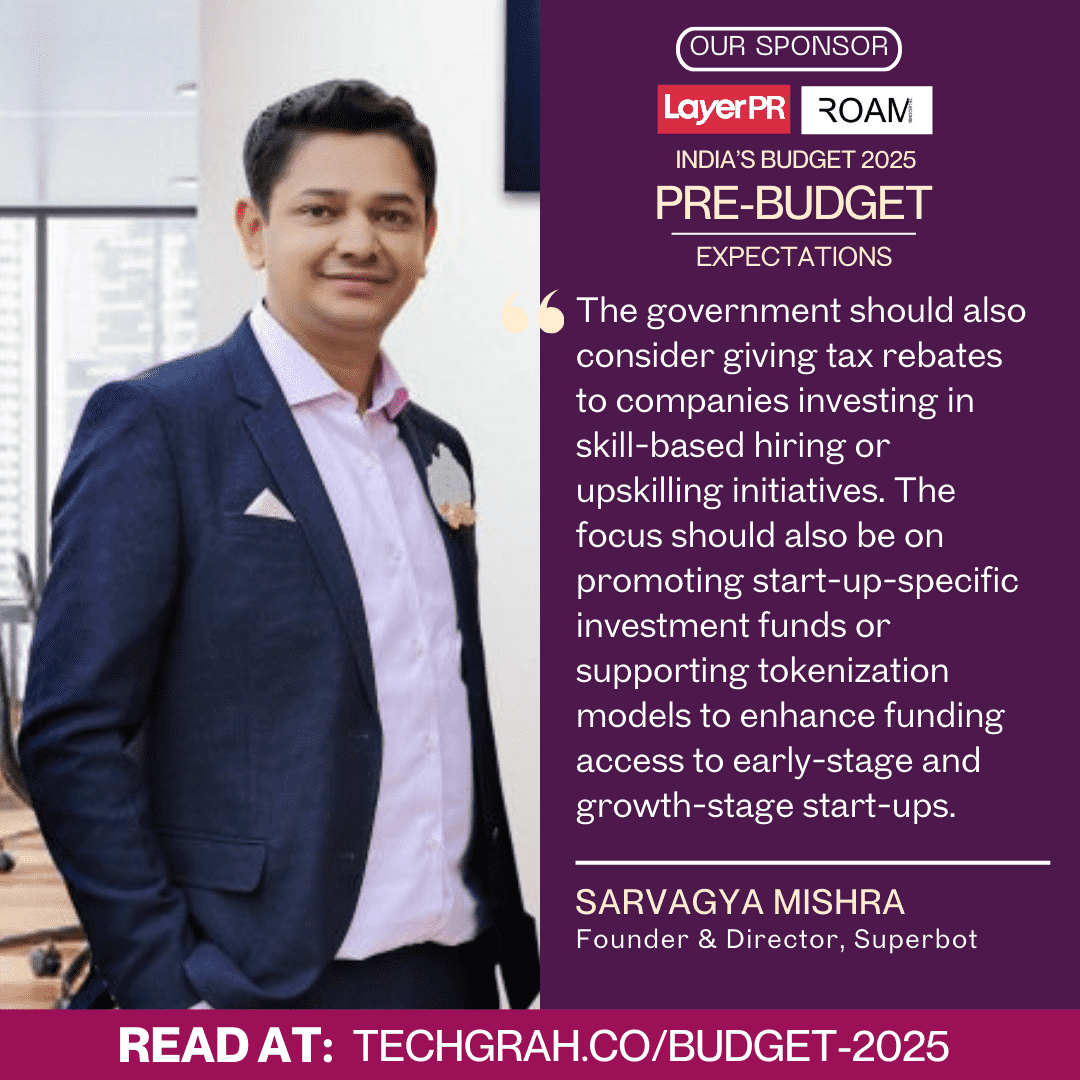
All eyes will be on the Finance Minister as she announces the Union Budget 2025. We believe that this year, we have an incredible opportunity to position India as the global hub for AI innovation and hope that the Union Budget 2025 will give a great boost to AI research, development, and commercialization to drive job creation and economic growth.
The government should consider supporting entrepreneurship in the field, by introducing tax rebates and subsidies for AI start-ups in the domain of healthcare, education, and governance – promoting AI innovation in solving real-world problems. The budget should look at addressing hyper-local challenges, improving agricultural yields, or making education more accessible in India.
Furthermore, provisions should also be in place for boosting AI infrastructure, high-performance computing, and skill-building in the domain. The government should also consider giving tax rebates to companies investing in skill-based hiring or upskilling initiatives. The focus should also be on promoting start-up-specific investment funds or supporting tokenization models to enhance funding access to early-stage and growth-stage start-ups.
The government may also have the critical task of ensuring data privacy while allowing start-ups to innovate in creating global models of excellence. Government initiatives in promoting global collaboration will help Indian start-ups gain recognition and prominence on the global stage.
Dinesh Jotwani, Co-Managing Partner, Jotwani Associates
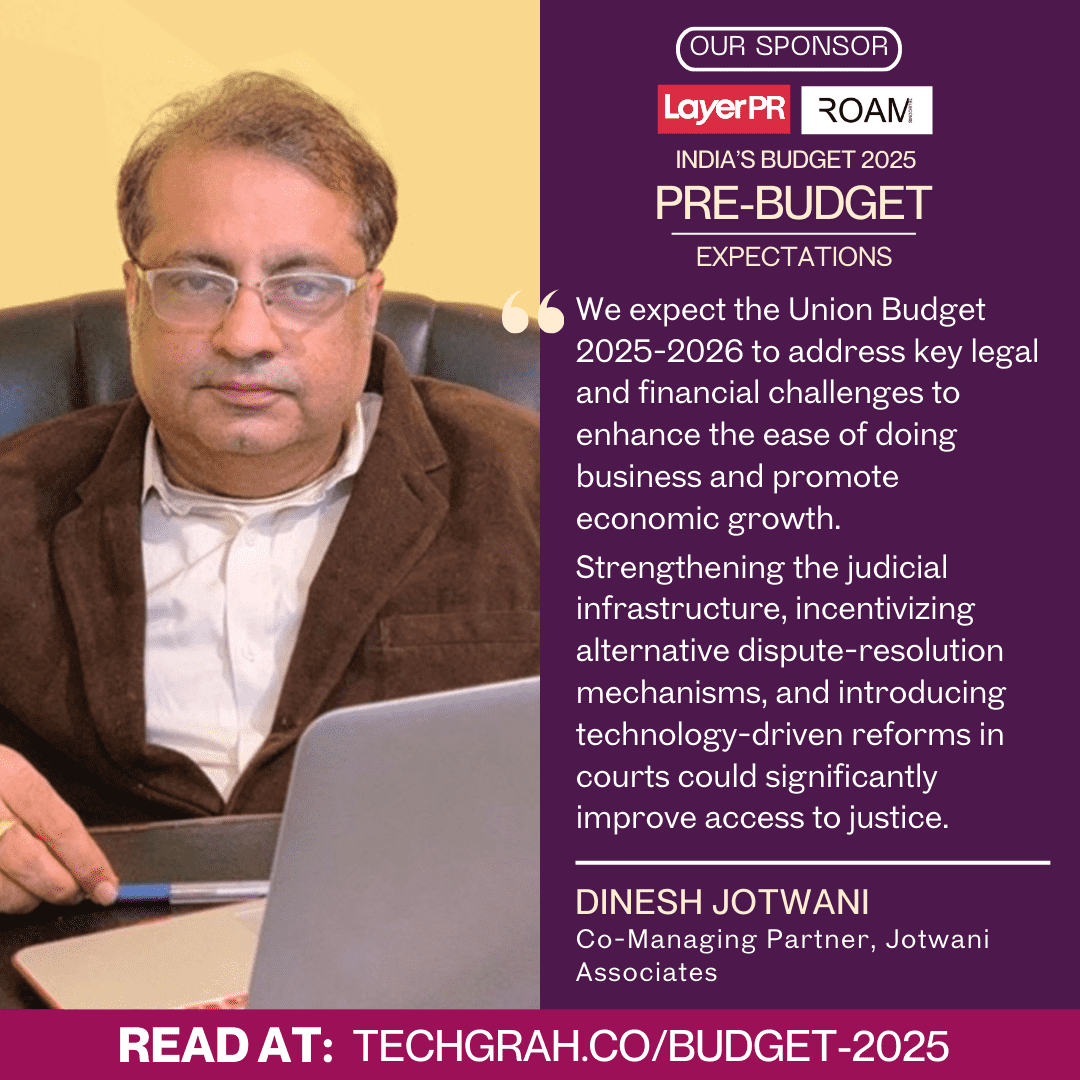
We expect the Union Budget 2025-2026 to address key legal and financial challenges to enhance the ease of doing business and promote economic growth. Strengthening the judicial infrastructure, incentivizing alternative dispute-resolution mechanisms, and introducing technology-driven reforms in courts could significantly improve access to justice.
On the financial front, simplification of tax structures, rationalization of GST rates, and enhanced clarity in compliance requirements for professionals, startups, and MSMEs would bolster confidence in India’s legal and economic framework. Greater alignment between legal and financial policies will be crucial to sustaining investor trust and fostering innovation.
Anand Jain, Co-Founder & Chief Product Officer, CleverTap
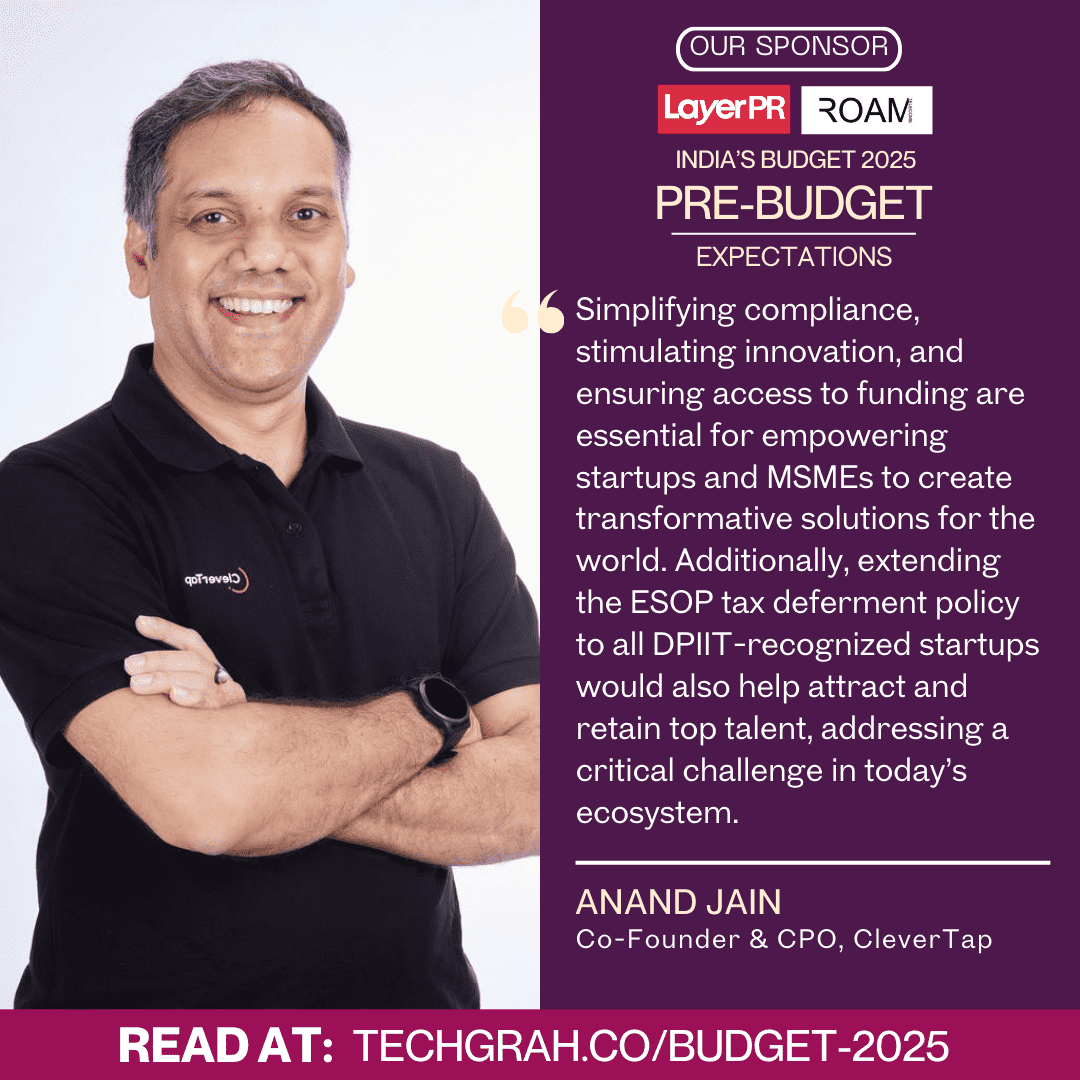
With the upcoming budget, it’s crucial to prioritize emerging sectors like SaaS, Web3, and AI. Together, they are transforming industries and positioning India as a global technology leader. Clear regulatory frameworks for digital assets, smart contracts, and SaaS platforms will help foster innovation, attract investment, and enhance competition in these high-growth areas.
As a SaaS company, we see immense potential in policies that drive the adoption of cutting-edge technologies like AI. Initiatives such as the Centers of Excellence for Artificial Intelligence, the INDIA AI mission, and the ‘Make AI in India’ programs are commendable. Expanding incentives for AI-driven solutions across governance, education, and healthcare could further accelerate India’s digital transformation and solidify its leadership in the global AI landscape.
At the same time, the reduction in LTCG tax rates for unlisted shares to 12.5% last year was a positive step. Simplifying compliance, stimulating innovation, and ensuring access to funding are essential for empowering startups and MSMEs to create transformative solutions for the world. Additionally, extending the ESOP tax deferment policy to all DPIIT-recognized startups would also help attract and retain top talent, addressing a critical challenge in today’s ecosystem.
From a broader perspective, revisiting income tax slabs should also be a priority. With rising living expenses significantly reducing disposable income, consumption has slowed, impacting economic momentum. Providing relief through taxation adjustments would help ease financial pressures, encourage spending, and drive growth across sectors. A more progressive framework could further boost demand, benefiting businesses, including startups and MSMEs.
Chandan Singh Ghugtyal, Founder & CEO, DAAKit Technologies

India’s D2C (direct-to-consumer) sector is witnessing remarkable growth, driven by innovation, consumer-centricity, and sustainability-focused initiatives. Yet, operational hurdles like the complex GSTN registration process for new locations are slowing down this momentum. The current system is riddled with inconsistencies and delays, creating significant challenges for brands looking to scale efficiently.
DAAKit Technologies urges the government to use Budget 2025 as a platform to simplify compliance. We recommend introducing a centralized and transparent “Do’s and Don’ts” checklist for GSTN registration. A standardized, streamlined approach would enable D2C brands to expand seamlessly while focusing on growth, innovation, and customer satisfaction.
By addressing these challenges, the government can unlock the true potential of India’s D2C ecosystem, supporting entrepreneurial growth, accelerating economic progress, and strengthening the “Make in India” vision. Simplified compliance isn’t just reform—it’s the foundation for creating an Atmanirbhar Bharat where businesses thrive and global competitiveness flourishes.



